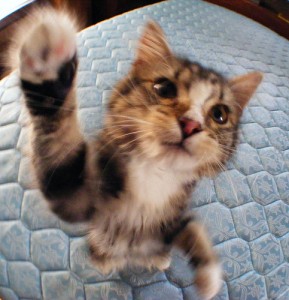[Another longish essay-ish post about my new favorite topic. About 10 minutes to read. The first essay is here.]
Why did you do what you did last night? Why did you open your computer today? And why, getting to the point, did you choose to read this post? This is my second post about “value systems.” That is, those little systems in you (and every living thing) that helps you choose what you do.
I said that talking about a value system is difficult because it is so obvious, like trying to point to air. But we do think about air at times—especially when we don’t have it! Just last week my Berlin flatmate decided to stain some wood in our kitchen. The smell of those harsh chemicals burned my nostrils, triggered an instant headache, and had me running for the door in a desperate bid for fresh air.
Likewise, to see the importance of a creature’s value system, we can look for cases where the system leads them wrong. We can find these cases in fearless ill-fated rats, bumbling bees, lonely Russian men, and —just maybe— even in you as you read this.
–
Speaking of un-fresh air in my flat, it’s only fitting the first example begins in a cat litter box. Or shortly before the box, to be precise. Toxoplasma gondii, known as “toxo” for short, is a parasite with a fondness for cats. They are so tiny that 10 could fit across the width of a human hair. And for reasons we won’t get into here, they can only reproduce in cat intestines. (Sorry, another story about little creatures in the digestive system!) Once some baby toxos have been made, its time for them to venture out in the big world for a grand adventure of their own. And if it was a family kitty, the first stop on that adventure is a litter box.

Toxos at play.
(Photo from Wikipedia.)
Once outside, the young toxos face a problem: how are they going to follow their dreams of settling down in a cat gut all of their own? They are far too small to make it on their own. The answer, it turns out, is with unwitting help from another creature, the second star actor in this story.
Rats, for reasons known only to them, eat cat poop. When this happens, it is a big step for the baby toxo. The next step in his life adventure. But remember that he can’t reproduce here–he needs a cat. But it is here, inside the rat, that toxo works his value-system magic.
Rats, as a rule, are terrified of cats. Their value system concerning cats might look like this.
Once in the rat, the young toxo makes his way to the rat’s brain. Once there, he does a little bit of tinkering that scientists still don’t fully understand. (They recently found that toxo DNA contains sequences related to dopamine production in animals, and dopamine is a big player reward systems.) In any case, the results of this tinkering in the rat are astounding. It is no longer is afraid of cats. Moreover, the smell of cat urine becomes sexually arousing!

This change of values, as you might suspect, doesn’t bode well for the newly fearless rat. Rats who enjoy a cat’s company are likely to become a cat’s dinner.

Typical toxo home
(Photo from ShutterSparks)
This sad truth for the rat brings up an deep point about value systems. To function correctly, they must be tuned needs of the organism and the realities of the environment it lives in. A rat who likes cats is not tuned to the realities of cats. [1]
In any case, the cat’s easily caught meal is a big win for our young toxo. He will soon find himself, along with the rat (now deceased), in the cat’s small intestine. He made it! And if this toxo is very lucky, the cat might have earlier ingested a different rat with a different toxo, who has been patiently waiting. You can imagine the scene. Two young toxos see each other from across the intestine. Their eyes lock. They come closer. “You complete me,” whispers the new arrival. And so, thanks to some value-system modification, the circle of life goes round once more, toxo-style.(Okay, that last part may not be strictly scientifically accurate…)
–
For a second interesting case of value system misfires, consider the curious case of Ophrys Orchids, also known unflatteringly as “Prostitute Orchids.” Like most flowers, they rely on bees to get their pollen to other orchids. What’s different is how they do it. [2]
You see, these flowers look just like a very attractive female bee. And not only does “she” look great, but she smells great too. The orchid emits the scent of virgin female bumblebee pheromones. For the casual male bumblebee innocently flying by, all signs point to “Go!”. And indeed he goes, engaging in what scientists call “pseudo-copulation.”
There’s a reason one scientist referred to these orchids as the “inflatable love dolls of the floral kingdom.”

That’s one fine looking bee—or is it?
The Bumblebee Orchid, aka Ophrys bombyliflora. (Photo from Wikipedia)
After some time the male bee figures out the “pseudo” part of what’s going on, and flies away. Now he is (1) covered with pollen and (2) really in the Mood. So he flies off, doubly determined to find real romance. Yet if the orchids have their way, this next “bee” will be just like before. And the frantic moves of this second attempt, he now deposits the first orchid’s pollen onto the second, insuring a next generation of flowers. What clever orchids! And what a seriously frustrated bee!
So what does this have to do with a value system? The bee, like the toxo-infected rat, is following the dictates of his value system. It looks something like this.

The difference between the sucker rat and the sucker bee is that the bee’s system wasn’t changed. He liked female bees just as much before the orchid encounter as after. Instead, the orchid tricked the bee’s perception. The rat in our first example still perceived cats as cats, but simply was not afraid of them anymore. The bee perceived the orchid to be a sexy bee.
The rat perceived the world correctly, but valued it wrong. The bee perceived the world wrong, but valued his illusion correctly.
–
Sure, we can giggle at the foolish bee, and even feel sorry for the poor rat who perhaps thought he could be pals with the cat. But what about us humans and our value system? Are we susceptible to this?
There are hundreds of species of orchids, but scientist have found none that resemble life-sized, good-smelling supermodels.
But consider this. Online security experts have reported that there are now programs in Russia that can simulate flirting in chat rooms. The program appears in the chat rooms as a flirtatious woman eager to talk. With clever banter, it attempts to lure the conversation partner into revealing personal information or even to send photos. The user may be infected with malware, or the information used to commit identity fraud.

Thinking about that woman from the chat room last night.
(Photo via Adam Jones, PhD.)
In comparison, it seems the bees got off easy. They lost lost only their time (and maybe their self-respect), but these chat victims could lose a lot of money (and definitely their self-respect).
–
So human value systems can be tricked by perception problems, just like bees. “There’s a sucker born every minute,” you might answer. But could humans be affected by the something like toxo? Could your value system be changed by some “brain tinkering”?
Turns out we don’t have to look far for an answer. Scientists have recently discovered that humans are also affected toxo.
Toxo doesn’t live only in rats and cats. It can live in any warm-blooded mammal. That’s the reason pregnant women are advised to stay away from litter boxes—a new toxo infection can cause serious problems for a developing fetus. You can also get it by eating undercooked meat from an infected animal.
Wait, it gets more interesting.
Not only could you be infected, there’s a real chance that you already are. This is no joke. 11% of people in the United States have it. In France the number stands at 88%, 80% in Germany, 22% in Britain, and 4% in Korea. Worldwide, 1 in 3 people carry the toxo parasite.
Scientists have known this for years, but thought that the infection had no symptoms in humans. After all, toxo is specialized for rat brains. (You are a dead-end for toxo, as there is such small chance of you being eaten by a cat.) However, recent studies have shown that toxo does make subtle but significant and observable changes. To quote one study of those infected, “The men were more likely to disregard rules and were more expedient, suspicious, jealous, and dogmatic. The personality of infected women, by contrast, showed higher warmth and higher superego strength, suggesting that they were more warm hearted, outgoing, conscientious, persistent, and moralistic. Both men and women had significantly higher apprehension compared with the uninfected controls.”
Value systems are important. Just like I was in bad shape without clean air, the rat was in bad shape with a broken value system. Just like the bee was fooled into thinking he was doing something valuable, some Russian man was fooled into thinking he chatted up a girl.
And most surprisingly, human value systems can be changed from the inside as well. Yet those changes are different. Toxo isn’t getting people eaten by cats, just some other personality changes. If and toxo can change personalities, is this good or bad? Can there be good changes to a value system, just as there are bad? Some researchers have even gone so far as to suggest that toxo infection has shaped much of what we call human civilization. There is a deeper question here: What do words like “good” and “bad” mean if not within a value system?
###
.
.
.
[1] “Evolution trained on data for 4 billion years, involving (as I estimate) perhaps 10^35 or more separate learning trials, and in a sense distilled all this learning into a compact expression in the DNA. The DNA program is quite compact compared to this massive training.”
[2] Strictly speaking, Orchids don’t need new pollen to make new Orchids. They can do it alone if needed. But pollen from others mixes the genes, and gives a better chance for the new generation.
More references and further reading:
- Toxoplasma gondii
- Radiolab podcast about toxo
- Effects of Toxoplasma on Human Behavior
- Orchids: Inflatable love-dolls of the floral kingdom
- Warning sounded over “flirting robots”
- Eliza – an simple example from the 1960’s of a chat program, this one emulating a psychotherapist.
- Can the common brain parasite, Toxoplasma gondii, influence human culture?
- Robert Sapolsky on Toxo
